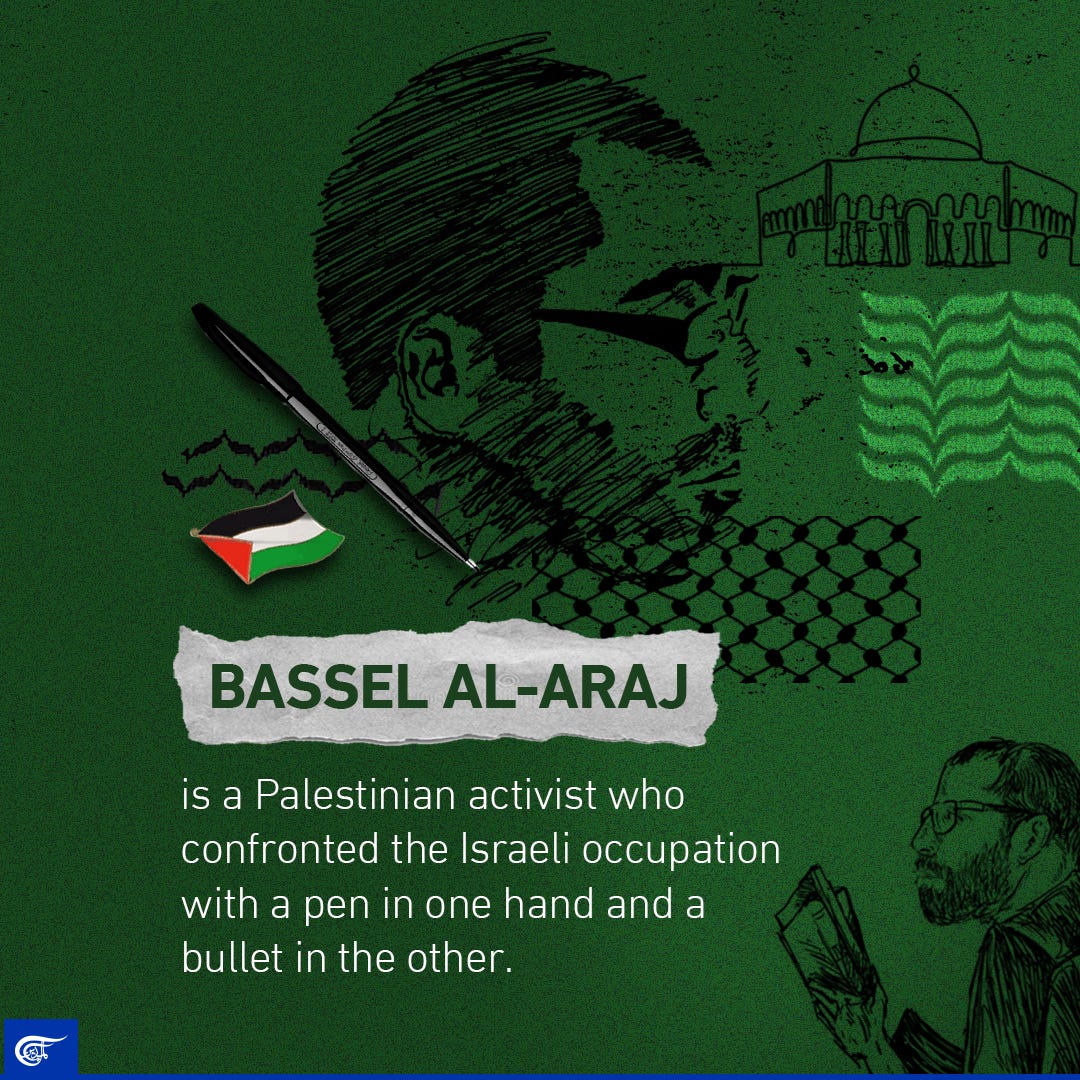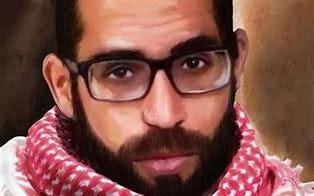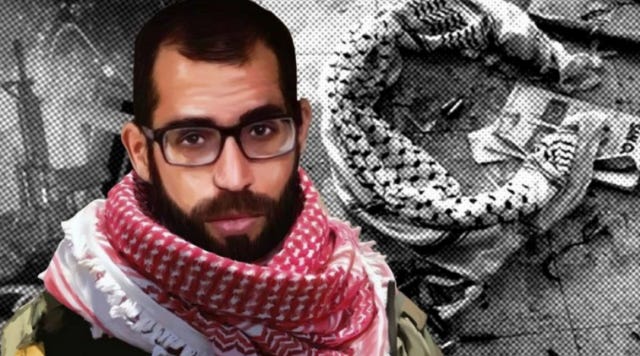Who was Bassel al-Araj?
“If you don’t want to be engaged – if you don’t want to confront oppression – your role as an intellectual is pointless.”
Gift to Palestinian Freedom Fighters and the resistance movement around the globe on the commemoration of NAKBA May 15th.
The martyrdom of Bassel al-Araj in 2017 has become one of the most recognizable icons in the Palestine resistance movement. Why?
When in prison, he was asked by his lawyer Muhannad Karrajeh, what is the message you would like to give to the Palestinians youths. He said I do not have any words but recite the quote of Imam Hussain to my Palestinian youths.
“By God, I will never surrender to my enemies like a humiliated person and never pledge allegiance to them like slaves.”
Bassel al-Araj fought a two-hour gun battle with Israeli Occupying forces (IOF) before the terrorist bombed his house on March 6, 2017.
Imam Hussain sacrifice and his stand against Yazid in fighting oppression and unwavering commitment to justice was inspiring story that resonate and mesmerized Al-Araj.
Imam Hussain at the battle of Karbala said: “…Let any calamity befall me … Hussain will cheerfully meet any catastrophe but never surrender Truth to Falsehood.”
Al-Baqarah the Noble Qur'an Verse 2:21 –
The Help of Allah is Near مَتىَ نَصْرُ اللَّهِ أَلَا إِنَّ نَصْرَ اللَّهِ قَرِيبٌ Matā nasrullahi alā inna nasrallāhi qarīb ‘When will Allah’s help come?’ Behold! Allah’s help is indeed near do not lose hope! What a coincidence Nash-raluah is just across the border.
As we find ourselves living in a time of fear, anxiety, and uncertainty, this verse is a reminder of optimism. It was revealed when the Muslims were surrounded by the enemies and filled with fear during the battle of Khandaq.
Al-Araj was a prominent Palestinian intellectual, writer, and activist who became a symbol of resistance and struggle against Israeli occupation.
He was known for his deep commitment to Palestinian liberation and his role in educating and inspiring the Palestinian youth.
Al-Araj was born in al-Walajah, a village between Bethlehem and Jerusalem with a population of two thousand with twelve thousand acres of fertile land before NAKBA.
In 1948 the IOF expelled all the villages inhabitants and took control of the entire area. Most of the displaced villagers crossed over to the other side of the valley to Jordan.
There is little documentation of his childhood, but he was an effluent reader. He studied in Egypt as a pharmacist and returned to Jerusalem to work in Shu’fat refugee camp.
Al-Araj read passionately about history, anthropology, politics, and philosophy. He connected his reading to his activism.
His thoughts about politics and resistance were from studying anti-colonial thinker Ali Shariati, the Iranian intellectual, revolutionary and sociologist.
He led a youth movement against what he believed were the dangers of normalization with Israel without the right to return. He did organized protests in West Bank which was controlled by Palestinian Authority (PA).
Al-Araj's death was a big loss to all of Palestine, but his legacy guides all the freedom fighters through the struggle. He was extremely popular amongst Palestinian youth. Al-Araj was becoming a global icon and a threat to IOF.
Al-Araj was a beacon for the youth, and he left a mark on all those who interacted with him, and he sacrificed his own blood for it.
Al-Araj is the image of the revolutionary activist – a pharmacist by trade, with his signature black-framed glasses perched on his nose, a gun strapped over his shoulder and wrapped in a checkered keffiyeh.
Al-Araj, 31-year-old, was well known for his writings about revolution. His death by IOF and complicity by PA authority was deeply disturbing to his family and the freedom fighters.
Al-Araj came to be known as the victim of security coordination between the PA and Israel, which he vocally opposed through his writing.
President Mahmoud Abbas boasted of al-Araj's arrest as an example of the PA's successful security coordination with Israel.
Al-Araj became increasingly involved in the resistance movement by attending numerous martyrs’ funeral processions and gave political lectures at university and justice institutes.
Al-Araj had an encyclopedic knowledge of Palestinian history, He began to translate his immense knowledge into writing and lecturing.
Al-Araj would always be reading a book and telling stories about Palestinian resistance history when he travelled to West Bank.
In 2014 he joined the Popular University as a professor to teach history of Palestine. He started Bab el-Wad online magazine so he and others could share their historical research, political analysis, and liberation struggle.
In early April 2016, the first line defense of Zionist - Palestinian Authority (PA) police arrested al-Araj and five others outside of Ramallah.
Four months later, no charges were filed so they went on hunger strike to demand their release, resulting in a public campaign calling for the PA to let them go, which it eventually did in early September.
It has become routine for the PA to do Israel’s dirty work of torturing Palestinians to extract information, then releasing them and facilitating re-arrest by the Zionist.
IOF re-arrested the five, but Al-Araj evaded capture, however on March 6, 2017, IOF raided the house in al-Bireh where he was hiding. After a two-hour gunfight, the IOF fired rockets into the apartment, killing al-Araj.
The IOF held al-Araj’s body for eleven days before giving it to his family for burial. Those who went into his hideout after the battle found a stack of his unpublished writings.
A year after his martyrdom, Bissan bookshop published his handwritten texts, letters, and his previous writings under the title “I Have Found My Answers,” awaiting the English version.
Being an ardent writer and lover of history especially of Palestine every essay will begin with the history of resistance movement.
He was a very excellent storyteller, a trait he acquired from his grandfather. He wrote extensively on the story of pain and the crimes of IOF of forced expulsions of 1947.
It is a reminder that the Nakba was a horror, lived in real time by elders then and now. He encouraged the youth to learn the history of the NAKBA where Zionist are systematically destroying evidence of 1948 from the archives.
He has authored numerous essays such as “how do we get free?” “Why do we go to War?” “Lessons of the Past,” “Fuel for the Future,” “No Love for the Oppressed,” “Out of the Law and into the Revolution,” “Art in Palestine”, “Abdelqadir Return to Jerusalem”, and “poetry and songs of Palestine during war, prison and on the hillside.
Every of his essay will conclude with an extended discussion of Malcolm X, the African American civil right leaders and Ali La Pointe, Algerian liberation from France.
With his immense range of reading and knowledge, one of the striking facets of al-Araj writing is forthrightness, and sincerity. Al-Araj was one of the most critical contemporary minds serving the resistance.
His famous essay was the “Live as a Porcupine, Fight like a Mosquito.” The porcupine (Al Shayham) is a rodent mammal. Its body is covered with spikes used for self- defense.
Porcupines are night animals that live underground in large holes that connect to a network of tunnels – Palestine liberation fighters have a high sense of security.
The flea or mosquito is a tiny insect, mostly living as a parasite on other animals, mostly mammals. The flea has fascinating fighting strategies and techniques; it stings, jumps, and stings its host causing itchy red spots.
What it does is exhaust its host and consume its blood, causing constant disturbance, eventually preventing the host from being able to sleep. It makes the host nervous and demoralized.
He analyzed Palestinian Resistance fighters (PRF) as when the enemy advances, we retreat; we harass and the enemy tires, we attack; the enemy retreats, we pursue.
This theorization on guerilla warfare can be described as the Mosquito warfare between the IOF and PFF.
The Zionist dog does not die merely, it becomes too weak- in military terms, over-extended; in political terms, too unpopular; in economic terms, too expensive - to defend himself. What a foresight!
At this point, the flea, having multiplied to a real plague of fleas through a long series of small victories, each drawing its drop of blood …” Live like a porcupine, fight like a flea is the strategy of PRF or Palestinian Freedom Fighters (PFF.)
Al-Araj wrote as his final testament when he was sure his time for martyrdom was near where the IOF would kill him.
He wrote “If you are reading this, it means I have died, and my soul has ascended to its creator. I pray to God that I will meet him with a guiltless heart, willingly, and never reluctantly, and free of any wit of hypocrisy…now I walk to my fate, satisfied that I have found my answers.”
The foresight of Palestinian Martyr Bassel Al-Araj was unimaginable and looking today the genocide committed by IOF. He wrote in 2017 on the nature and rules of war:
Ø Strengthen your willpower, patience, and endurance. Never give up!
Ø Zionist will spread propaganda of victory, captured PRF but do not lose your resolve or instill a sense of defeat.
Ø Enemy will assassinate your leaders but do not be disheartened as all of this is part of psychological warfare.
Ø This is not the war between armies but with a society and ideology, Hamas is society and ideology.
Ø Do not measure success against conventional wars, what the PFF are fighting is liberation. Our loss will be greater than the enemy, do not be discouraged, we can bear the loss.
Ø Never spread the occupation's propaganda on social media, and do not contribute to instilling a sense of defeat.
Ø Never spread panic; be supportive of the resistance and do not spread any news broadcast by the occupation.
Ø Lastly, every Palestinian and Justice lovers are freedom fighter, and all are on the frontline do not fail in your duty.
Today you see the students with student loans, and no prospect of job are on the front line. Al-Araj has attained martyrdom with a brilliant legacy which still haunts the Zionist IOF.
“By God, I will never surrender to my enemies like a humiliated person and never pledge allegiance to them like slaves.”
The resource for the above essay is from U-tube video/lecture of Dr. Kamaal Sheriff, Dares salaam, Tanzania.







